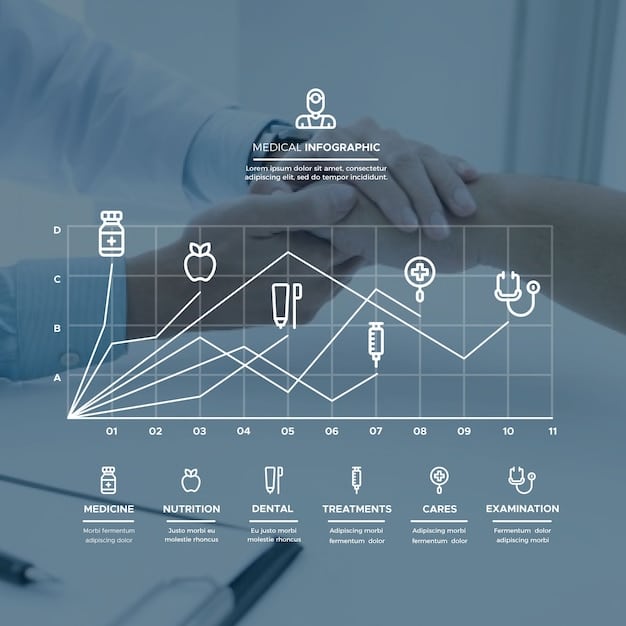AI in US Healthcare Administration: 5 Key Transformations

AI is revolutionizing US healthcare administration by automating tasks, improving accuracy, and enhancing efficiency across various applications.
The US healthcare system is undergoing a significant transformation, and at the forefront of this revolution is artificial intelligence (AI). This article, “How AI is Transforming US Healthcare Administration: A Look at 5 Key Applications,” delves into the specific ways AI is reshaping administrative processes, offering insights into improved efficiency, reduced costs, and enhanced patient care.
AI-Powered Automation in Claims Processing
Claims processing has traditionally been a time-consuming and error-prone task in healthcare administration. AI is streamlining this process through automation, reducing manual intervention, and accelerating payments.
Automated Data Entry
AI systems can accurately extract relevant information from claim forms, reducing the need for manual data entry. This minimizes errors and ensures faster processing of claims.
Fraud Detection
AI algorithms can analyze claims data to identify patterns indicative of fraudulent activities, helping healthcare providers and insurers prevent financial losses.
- Increased Efficiency: AI automates repetitive tasks, freeing up staff to focus on more complex issues.
- Reduced Errors: Automated data entry minimizes manual errors, leading to more accurate claims processing.
- Faster Payments: Streamlined processes result in quicker payment cycles for healthcare providers.
- Cost Savings: By preventing fraud and reducing manual labor, AI contributes to significant cost savings.
By automating key aspects of claims processing, AI is helping US healthcare organizations optimize their administrative operations, reduce costs, and improve overall efficiency.

AI in Enhancing Patient Scheduling and Appointment Management
Managing patient schedules and appointments can be a logistical nightmare for healthcare administrators. AI is offering intelligent solutions to streamline these processes and improve patient satisfaction.
Predictive Scheduling
AI algorithms can analyze historical data to predict patient no-show rates and optimize appointment scheduling accordingly. This minimizes wasted appointment slots and maximizes resource utilization.
Automated Reminders
AI-powered systems can send automated appointment reminders to patients via text or email, reducing no-show rates and improving adherence to treatment plans.
AI-driven chatbots can handle routine appointment inquiries, freeing up staff to focus on more complex patient interactions. This improves efficiency and provides patients with instant access to information.
AI-powered scheduling systems can automatically optimize appointment slots based on patient needs and provider availability, ensuring efficient use of resources and minimizing wait times.
AI is transforming patient scheduling and appointment management in US healthcare by optimizing resource utilization, reducing no-show rates, and improving patient satisfaction.
AI-Driven Revenue Cycle Management
Effective revenue cycle management is crucial for the financial health of any healthcare organization. AI is providing advanced tools to optimize revenue collection, reduce denials, and improve cash flow.
Predictive Analytics for Denials
AI algorithms can analyze claims data to identify patterns that lead to denials, allowing healthcare providers to proactively address potential issues and minimize revenue loss.
Automated Billing and Coding
AI-powered systems can automate the process of medical billing and coding, ensuring accuracy and compliance with regulatory requirements. This reduces errors and accelerates payments.
AI chatbots can assist patients with billing inquiries, providing them with instant access to information and resolving issues efficiently.
By leveraging AI for revenue cycle management, healthcare organizations can improve financial performance, reduce administrative costs, and focus on delivering quality patient care.

AI for Improved Medical Coding and Documentation
Accurate medical coding and documentation are essential for proper reimbursement and compliance. AI is offering innovative solutions to streamline these processes and improve data quality.
Natural Language Processing (NLP)
AI leverages NLP to analyze unstructured clinical notes and extract relevant information for accurate coding and documentation. This reduces manual effort and minimizes errors.
Computer-Assisted Coding (CAC)
CAC systems use AI algorithms to suggest appropriate codes based on clinical documentation, improving coding accuracy and efficiency.
- Enhanced Accuracy: AI algorithms minimize coding errors, ensuring proper reimbursement and compliance.
- Increased Efficiency: Automated coding processes reduce manual effort, freeing up staff to focus on other tasks.
- Improved Data Quality: AI helps to ensure that clinical documentation is accurate and complete.
By leveraging AI for medical coding and documentation, healthcare organizations can improve data quality, reduce administrative costs, and ensure compliance with regulatory requirements.
AI-Powered Predictive Analytics for Resource Allocation
Efficient resource allocation is critical for optimizing healthcare operations. AI is providing powerful predictive analytics tools to help healthcare administrators make informed decisions about resource allocation.
Demand Forecasting
AI algorithms can analyze historical data to forecast patient demand for various services, allowing healthcare providers to allocate resources accordingly. This minimizes wait times and optimizes staffing levels.
Capacity Planning
AI-powered systems can help healthcare organizations plan for future capacity needs based on predicted demand, ensuring they have the resources available to meet patient needs.
By leveraging AI for predictive analytics, healthcare organizations can optimize resource allocation, improve operational efficiency, and enhance patient care.
| Key Aspect | Brief Description |
|---|---|
| 🤖 Automated Claims | AI speeds up and reduces errors in processing insurance claims. |
| 📅 Smart Scheduling | AI enhances patient scheduling, cutting down no-shows. |
| 💰 Revenue Cycle AI | AI optimizes revenue flow and decreases claim denials. |
| 🩺 Coding Efficiency | AI improves accuracy in medical documentation, reducing errors. |
FAQ
▼
AI automates data entry, detects fraud, and speeds up the claims process, reducing errors and costs.
▼
AI improves scheduling by predicting no-shows, automating reminders, and optimizing appointment slots.
▼
AI enhances revenue cycle management by predicting denial rates and automating billing processes.
▼
AI improves medical coding through natural language processing and suggesting accurate codes.
▼
AI assists in resource allocation by forecasting patient demand and optimizing staffing levels for healthcare.
Conclusion
AI is rapidly transforming US healthcare administration by automating tasks, improving accuracy, and enhancing efficiency across various applications, paving the way for a more streamlined and patient-centered healthcare system.





